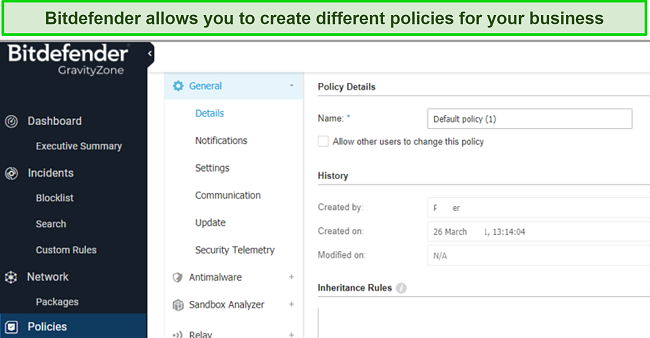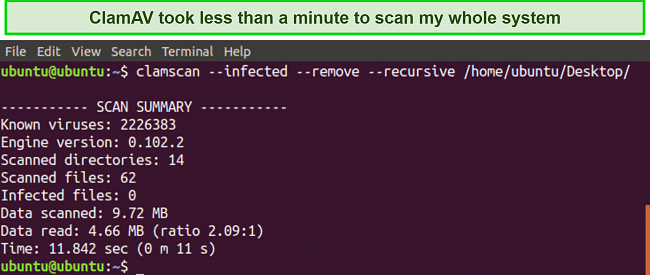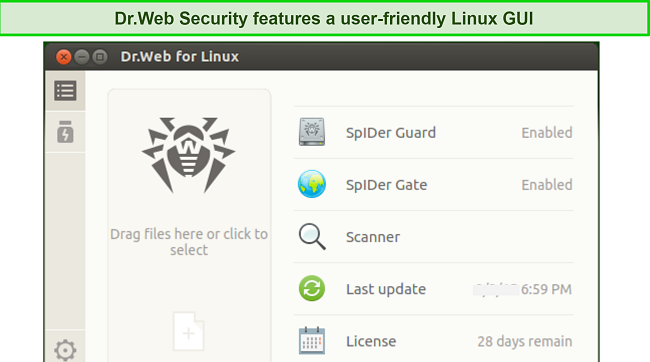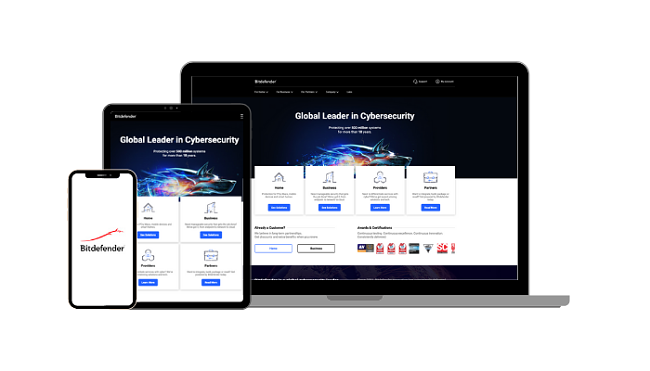The 5 Best Antivirus for Linux in 2024
Linux-based systems have long been considered immune to threats. However, there’s been a recent surge in malware attacks on Linux-based systems involving trojans, web shells, coin miners, and ransomware.
After thoroughly testing 20+ Linux-based antiviruses, I’ve found 5 antiviruses that are truly the best. They all provide excellent malware detection rates, real-time protection against the latest threats, and work with all the major Linux distributions.
Although every antivirus on this list is great for Linux, my top pick is Bitdefender as it offers perfect malware detection rates and a bunch of useful extra features. You can try Bitdefender for 30-days using its money-back guarantee. This way, you can test it out before committing to a subscription.
Quick Guide: 5 Best Antivirus Software for Linux
- Bitdefender — Top-tier Linux antivirus for home and enterprise users.
- McAfee — Support for a wide range of distros, but more suited for businesses.
- Sophos — Lightweight Linux antivirus with real-time and on-demand scanning, but no desktop GUI.
- ClamAV — Free and open-source antivirus for Linux with multi-threaded scanner daemon, but only works with CLI.
- Dr.Web Security — Protects emails on Linux systems from spam, but doesn’t work well on all distros.
The Best Antiviruses for Linux — Full Test Results in 2024
1. Bitdefender Endpoint Security Tools — Excellent Cloud Antivirus for Linux
Key Features:
- On-access and on-demand scanning
- Supports a wide range of distros.
- Firewall protection.
- App sandboxing.
Bitdefender Endpoint Security Tools (BEST) for Linux, also known as GravityZone, provides malware protection for most popular Linux operating systems using on-access and on-demand scanning. It is compatible with the following popular distros:
- Red Hat Enterprise
- CentOS
- Ubuntu
- Fedora
- OpenSUSE
- Oracle
BEST allows you to execute on-access scanning on pre-configured system directories from its cloud-based control center. You can set policies and schedule quick, custom, or full scan tasks on your endpoints. During my tests, BEST’s machine learning-based antivirus scanner provided perfect malware detection rates, providing real-time protection against threats.
I like how BEST’s firewall offers robust protection for my Linux machine. It allowed me to determine the type of web traffic and specific devices that can plug into the system.
This proved helpful in detecting malicious scripts and preventing exploitation of SSH port 22, which I found more effective than Ubuntu’s UncomplicatedFirewall (UFW). This proved especially useful for a Linux system since you don’t have the benefit of a built-in firewall like Windows Defender.
Bitdefender for Linux offers a user-friendly graphical user interface. It was effortless to install on my Ubuntu machine. I only had to open my terminal and run a few commands to get it configured for my system. Once I set it up, I could use the command-line interface to initiate scans and check quarantined files and previous security events.
You can also manage your endpoints from anywhere using GravityZone’s cloud-based control center. It allows you to set policies for your network, manage firewall rules, app sandboxing, real-time process monitoring, and web security filtering for anti-phishing.
It also provides email protection where you can control email delivery, filter messages, and apply email policies across your network to stop targeted and advanced email threats.
In summary, Bitdefender Endpoint Security Tools offer excellent anti-malware, anti-phishing, and anti-ransomware solutions for your Linux home or enterprise systems. Bitdefender offers 3 plans for Linux with its GravityZone packages, with the pricing varying by the number of connected devices:
- GravityZone Business Security plan — This plan covers 3 to 100 devices (laptops, desktops, and file servers) and is the lowest-priced business plan. I’ll suggest this plan for small businesses looking to protect their networks without breaking the bank.
- GravityZone Business Security Premium plan — This plan covers 5 to 100 devices (laptops, desktops, file and mail servers or mobile devices*), but it costs nearly double the Business Security plan.
- GravityZone Business Security Premium + Add-ons — This plan is similar to the Business Security plan, only that it allows you to pay additional fees for add-ons like email security, patch management, and full disk encryption.
Medium-to-Large scale businesses can sign up for the GravityZone Business Security Enterprise plan using the 30-day free trial. You can also try the GravityZone Business Security Premium plan risk-free for your home or business networks.
2. McAfee Endpoint Security— #1 Business Antivirus for Linux-Based Systems
Key Features:
- Perfect malware detection rates.
- Supports a wide range of distros.
- Cloud-based engine and machine learning engine.
- Offers a web-based GUI interface.
McAfee Endpoint Protection for Linux offers robust protection for enterprise networks, small-scale networks, and multiple user systems. It is compatible with the following major distributions:
- Red Hat
- Ubuntu
- Fedora
- CentOS
- Debian
- Fedora
- SUSE
I like how McAfee Endpoint Security was easy for my IT department to deploy. It provides reliable features for scanning systems, security updates, and real-time protection. Similar to Bitdefender, McAfee combines cloud-based engine and machine learning techniques to identify and block malware and monitor unsafe behaviors of suspicious programs and scripts.
During my tests, McAfee Endpoint Security offered perfect malware detection rates, even for zero-day threats. It detected all the malware test samples on my test machine, including trojans, web shells, crypto miners, and ransomware. It also protects from spam, phishing, and malware while browsing the web, sending emails, and uploading data to the cloud on your Linux system.
McAfee’s dynamic application containment and remediation technologies make it very easy to protect your endpoints from malicious applications and threats like ransomware. You can use its simple web-based GUI interface and dashboard to manage your organization’s devices and networks, making it an ideal solution for any IT department.
McAfee makes it easy to automate virus scans for each endpoint, track scan results, and manage firewall activities, all while using fewer CPU resources.
McAfee Endpoint Security provides an excellent anti-malware engine that protects your Linux systems from emerging online and offline threats. It offers a 60-day free trial that covers up to 5 computers and networks. Once you’re done with the free trial, you can request a quote depending on your needs.
3. Sophos — Lightweight Linux Home Antivirus
Key Features:
- Supports on-demand and real-time scanning
- Advanced heuristic protection system.
- Supports a wide range of distros.
- Offers a web-based GUI interface.
Sophos offers a lightweight Linux antivirus for home users. It uses a signature-based malware detection system and advanced heuristic protection algorithms to detect behavior that indicates malicious activities, including zero-day attacks. Sophos is compatible with 14 major Linux distributions, some of which include the following:
- Red Hat
- Ubuntu
- Fedora
- CentOS
- Debian
- Fedora
- SUSE
During my tests, Sophos provided perfect detection rates, removing all Linux-based malware on my device and even those of other operating systems like Windows, Mac, iOS, and Android. It supports on-demand and real-time scanning and is effective at quarantining and removing trojans, worms, viruses, and all sorts of threats from the repository.
Sophos is easy to use on your Linux machine. You can easily manage your protection from Sophos’ web-based platform (Sophos Central), and, if you prefer a geeky method, Sophos allows you to use it via the command-line interface. Whenever you open, save, or copy a file, Sophos Anti-Virus scans it and grants access to it only if it is safe.
There are two versions — Sophos Antivirus for Linux 10 and Sophos Antivirus for Linux 9 for 64-bit and 32-bit Linux systems. However, Sophos will discontinue support for the latter in July 2023.
Sophos provides robust protection and firewall management and is compatible with popular Linux distributions. You can get Sophos for your Linux system using its 30-day money-back guarantee. After your trial expires, you will need to connect to a reseller for a quote depending on the number of machines you want to cover.
Intercept X Advanced is the most comprehensive endpoint protection plan that adopts machine learning for malware detection. It is priced competitively, resulting in a low monthly cost even when compared to other top antivirus suites.
4. ClamAV — Free Open-Source Antivirus for Linux
Key Features:
- Email protection.
- On-access and on-demand scanning.
- Supports a wide range of distros.
- Multi-threaded scanner daemon
ClamAV is a free and open-source antivirus for Linux. It protects a host of malware, including trojans, worms, rootkit, malicious codes, and viruses. ClamAV offers a cross-platform solution compatible with the following popular distros:
- Ubuntu
- Debian
- Fedora
- OpenSUSE
ClamAV features a multi-threaded scanner daemon, on-access scanning, mail scanning, command-line utilities for on-demand file scanning, and automatic signature updates. During my tests, its malware scanner detected over 90% of malware samples, which isn’t as robust as some of the other contenders on this list. For example, Bitdefender was able to detect 100% of all threats on my system.
You can run ClamAV’s scanner using the command line interface, which produces fast scan results. The anti-malware scanner also checks email attachments, mobile malware, archive, and compressed files, providing real-time protection. This is possible due to the ClamAV cloud-based engine that is constantly updated.

In summary, ClamAV is a lightweight Linux antivirus that provides a reliable anti-malware engine.
Although lacking a built-in graphical user interface (GUI), which might pose a hurdle for newcomers, those well-versed in the field will appreciate the valuable security and personalization options it provides. I’m particularly fond of ClamAV’s email gateway security feature, effectively shielding your Linux system from malicious emails.
ClamAV’s open-source nature is one of the things that makes it stand out. Allowing community members to contribute to the project provides a more secure product. But one thing you may notice about these Linux antivirus options is that they don’t include the same premium features as other platforms do. For instance, most of these options don’t include a VPN for an additional layer of security.
5. Dr.Web Security Space for Linux — Excellent for Workstation Protection
Key Features:
- Signature and heuristic analysis.
- Network protection.
- Supports a wide range of distros
- Protection from email-borne virus attacks.
- Graphical mode and command-line interface.
Dr.Web Security Space for Linux provides a cloud-based Linux antivirus engine. It uses signature analysis for known threats and heuristic analysis to detect unknown threats by monitoring malicious activities as top-tier antivirus programs do. Dr.Web Security supports many distros and server-side options such as:
- Red Hat Enterprise Linux Server
- Ubuntu
- Astra Linux
- Fedora
- Debian
- CentOS
- SUSE Linux Enterprise Server
Dr.Web virus databases and the antivirus engine provide near-perfect protection against malware. During my tests, it detected and neutralized different types of threats like viruses, trojans, mail, worms, and adware, including those that infect mail files and boot records. Dr.Web’s cross-platform support also detects malware from other operating systems like Windows and Mac. However, the scanner had too many false positives.
While Dr.Web will scan your emails for infected files and malicious links, it doesn’t provide the anti-spam feature for every distro. The “SpIDer Guard” feature scans new or modified files, tracking file operations for malicious changes. Similarly, the “SpIDer Gate” feature monitors all network connections and compares them with a list of unwanted web resources to prevent downloading malicious files.
Dr.Web provides an easy-to-use graphical interface. It allows users to run scans, view quarantined content, and manage other operations. You can use Dr.Web for Linux via the command-line interface. Overall, Dr.Web performs averagely, given that it doesn’t provide perfect detection scores as Bitdefender and Sophos do.
Warning! Avoid These 3 Linux Antivirus Brands
1. Avast
Avast, as a company, has reportedly been caught engaging in the unethical practice of selling its customers’ browser data. You don’t want to use a Linux antivirus for your home or enterprise that could sell your personal or business data to other companies.
2. Panda Antivirus for Linux
Panda Antivirus for Linux is no longer supported by its parent company. While the app is still available on third-party sites, you could be installing malware that could infect your system if you choose to use it.
3. Comodo Antivirus for Linux
Comodo Antivirus for Linux was very popular among Ubuntu users, but Comodo has since discontinued it. While the app is still available on third-party sites, I don’t recommend it since it is no longer supported and could infect your system.
Quick Comparison Table: 2024’s Best Antivirus Software for Linux
| GUI | Firewall | Distro support | Email protection | Server/Network protection | Free Version | |
| Bitdefender | ✔ | ✔ | 20+ | ✔ | ✔ | ✘ |
| McAfee | ✔ | ✔ | 45+ | ✔ | ✔ | ✘ |
| Sophos |
✔ |
✔ |
10+ | ✔ | ✔ | ✘ |
| ClamAV | ✘ | ✘ | 10+ | ✔ | ✘ | ✔ |
| Dr.Web Security | ✔ | ✔ | 15+ | ✔ | ✔ | ✘ |
5 Easy Steps: How to Use an Antivirus for Linux
- Decide your device type — Choose the antivirus software best suited for your home or business Linux system.
- Consider the number of devices to be covered — If you only need 1 device covered, ClamAV should be ok, but for anything more I would consider Bitdefender.
- Sign up for a plan — Visit the website of the and sign up for a plan. I recommend Bitdefender Endpoint Security Tools (BEST).
- Download and Install the client — Download the client app from your dashboard on the AV website and set it up. Contact support if you need technical assistance.
- Launch the client software — Open the GUI or CLI interface on your local device and run a scan or set policies from your central management dashboard for the different endpoints.
How I Tested and Ranked the Best Antiviruses for Linux in 2024
- Powerful antivirus engine — I tested each antivirus to ensure it provided perfect or near-perfect detection rates, guaranteeing complete protection for your Linux system.
- Fast scanning speeds — If you use a Linux-based antivirus that consumes too much processing power, you may experience slowdowns. This is why I only selected the Linux antivirus software with minimal CPU consumption and fast scanning options for your Linux-based systems.
- Bonus features — Besides safeguarding against malware, a top-notch antivirus designed for Linux includes extra security functions, such as email safeguarding. Each of the Linux-based antivirus options I’ve selected comes with email filters aimed at shielding you from phishing attempts, unsolicited spam, and harmful emails. Additionally, they provide customizable capabilities like on-demand scans and firewall defense
- Major Distro compatibility — All of the Linux antiviruses on this list are compatible with major distros, including Ubuntu, Fedora, Debian, SUSE, Red Hat Enterprise, CentOS, and Oracle, giving you a wide range of options.
- Ease of Use — Many Linux antiviruses are not user-friendly, only offering a command-line interface (CLI) for initiating scans and managing other processes. I chose options that provide a web-based dashboard, desktop GUI, CLI, or a combination of the options.
FAQ: Best Antivirus Software for Linux
Do I need an Antivirus for Linux?
Yes. Linux is generally very secure, but trojans and malware are on the rise on the platform. In addition, there’s been a high prevalence of ransomware, web shells (malicious scripts), and coin miners targeted at Linux servers.
Since most web servers use the Linux operating system and combine an endless amount of computing power, hackers have the incentive to mine the computing power, encrypt the drives, or install malicious scripts that steal business data.
Do Windows and macOS Antivirus work on Linux?
No, most big-name antiviruses for Windows and macOS are incompatible with Linux systems. However, some popular brands have robust antiviruses for Linux. McAfee and Bitdefender are popular antivirus brands on the Windows and macOS platforms that also support the Linux operating system.
These antiviruses have a large signature-based engine that detects malware across all operating systems. For instance, the McAfee Endpoint Security for Linux can detect Linux-based malware and even those of other operating systems like Windows and Mac.
What is a good Antivirus for Linux Ubuntu?
Given Ubuntu’s popularity for home and enterprise users, most Linux-based antiviruses ensure that they are compatible with this distro. However, not all Linux-based antiviruses provide robust protection for home and enterprise users.
Fortunately, Bitdefender Endpoint Security Tools (Best) and McAfee Endpoint Security are top antivirus brands that provide comprehensive protection for your Linux for home and enterprises. They provide top-tier security features, including on-access scanning, on-demand scanning, firewall, and mail filtering to keep your whole system safe.
Protect Your Linux Systems With a Top-Tier Antivirus
Linux is often regarded as a highly secure operating system in comparison to its counterparts. However, it is not completely immune to different risks. The Linux platform has witnessed a gradual rise in the presence of malware, trojans, worms, coin miners, and ransomware that specifically target its infrastructure. You can no longer depend on only the best configuration practices to protect your Linux systems.
Luckily, a few robust antiviruses can protect your Linux machines. I tested 20+ options and found the best antivirus for Linux. After rigorous testing, I found that Bitdefender Endpoint Security Tools (BEST) is one of the most reliable antivirus options for your Linux systems.
However, there are also other good options. ClamAV offers a lightweight Linux antivirus solution for home users but only works with the command-line interface (CLI). McAfee and Sophos provide both CLI and web-based GUI, making it easy for beginners to manage their endpoints from anywhere. Overall, whether you use Linux for home or your business needs, the above list of antiviruses would protect you from emerging threats.








Leave a Comment
Cancel